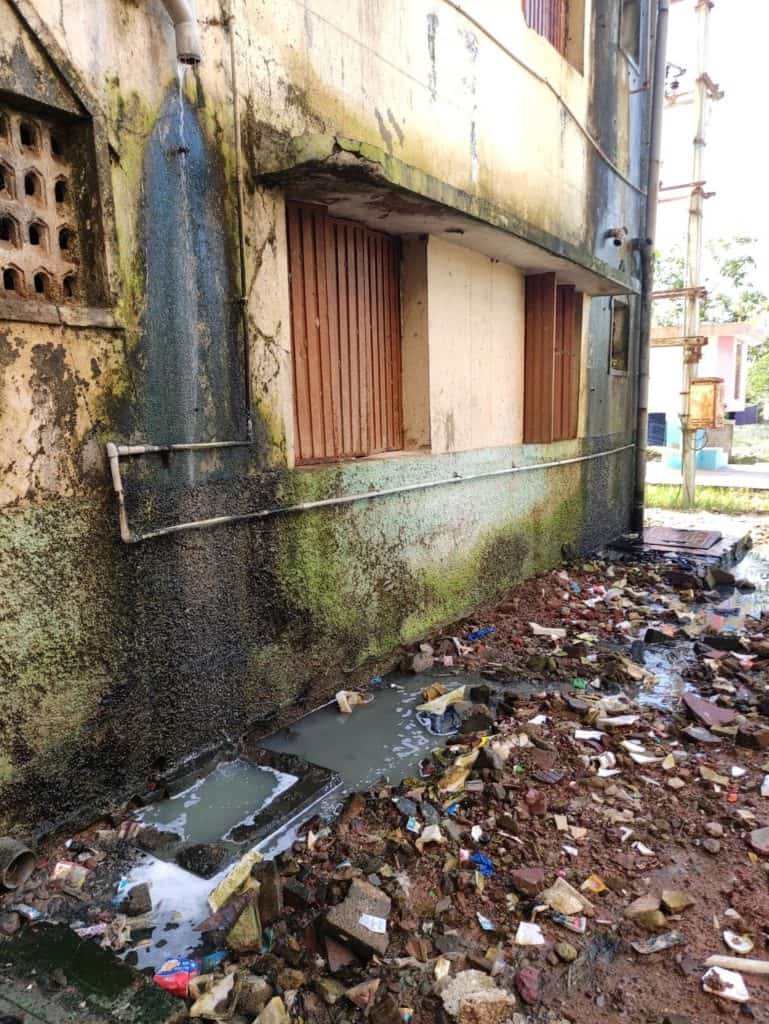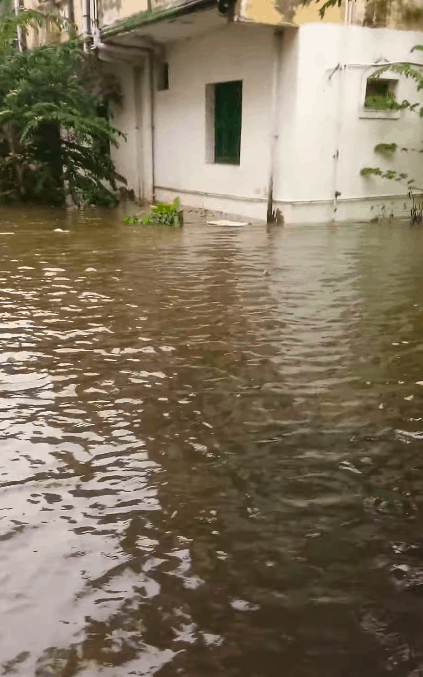A study by the Chennai-based NGO Information and Resource Centre for the Deprived Urban Communities (IRCDUC) was conducted in five resettlement colonies — Perumbakkam, Semmenchery, Gudapakkam, Navalur and All India Radio (AIR) Site, was carried out with an objective of examining and understanding the issues faced by those resettled families.
The findings show that there is an urgent need for the government to intervene as pointed out by Vanessa Peter, Founder of IRCDUC who had said that the study highlights the key issues that have to be looked into while framing the policy. Some of these had already been flagged in our previous article below.
Read more: Families in Chennai’s resettlement colonies need urgent attention and a fairer policy
But apart from the issue of forced evictions and the lack of a well thought out rehabilitation policy, the study also highlighted the poor infrastructure and management in sectors including housing, education, nutrition, schools, fair price shops, health, water, sanitation, waste management, roads, transportation, livelihood, employment and safety.
Flood-risk in resettlement colonies
Most of the resettlement colonies in Chennai till date are either in low-lying areas in the paths of flood or in isolated and remote locations not accessible by the resettled families.
A piece of land near a dumping ground in Kodungaiyur located in North Chennai was one of the first places where a resettlement project was carried out in Chennai, along with one in Velachery in South Chennai. Further, one was constructed in Kannagi Nagar in the late 1990s located in the Information Technology (IT) Corridor in the then Kanchipuram District (now Chennai district).
Also, a massive resettlement site was constructed in phases in a marsh land near the banks of Buckingham Canal in Kanchipuram District. However, the common trait found in all these resettlement sites are that they are located in low-lying flood-prone zones.
No emergency medical care
The Primary Health Centres (PHCs), which should cater to the health needs of the residents are either dysfunctional, irregularly functional or has no doctors present at all. Neither do the residents have access to ambulance services at times of need. This puts the lives of the patients in the hands of unqualified health staff in times of emergency.
While pregnant women from Semmenchery are referred to Kannagi Nagar Community Health Centre (CHC), which is located in another resettlement site comprising over 23,000 houses, women from Perumbakkam are referred to Chengalpattu Government Hospital, which is 45 kms away. For scans, pregnant women are referred either to Medavakkam or Tambaram, where there are no direct buses.
Sensitization among teachers an urgent need
In addition to the glaring gaps in the setting up of schools in proportion to the population, children are being evicted in the middle of their academic year. The non-availability of higher secondary schools in the vicinity and limited transportation facilities has resulted in an increasing rate of school dropouts who end up as child labourers.
In addition to these woes, the children are often chided by the teachers and are referred as ‘children from resettlement sites’, the practice which needs to be addressed through sensitization among the teachers with immediate effect.
The Anganwadi Centres (AWCs) in these tenements also do not have sufficient teachers to manage the student strength. Only two of the four AWCs are functional in Navalur, while lack of water facilities is the major concern in the nine AWCs in the AIR site.
Contaminated water, poor sanitation and the rampant skin disease
While access to clean drinking water remains a major concern which forces the residents to procure water cans for drinking, people from the AIR Site, Navalur and Perumbakkam specifically complained that the water tanks in the terrace did not have lids.
As they are unable to access the terrace, it is neither possible to clean or maintain the tanks. The poor quality of water and contaminated tanks cause skin infections among the residents.

In addition, blocked drains, poor garbage collection and disposal is also not new to most of the settlements. AIR site and Semmenchery is comparatively better than the other sites in the aspect of collection mechanism and disposal of garbage as these sites are within Greater Chennai Corporation (GCC) limits. Stagnant drain water because of broken pipelines, blocks, and storm water drains without covers is a rampant problem in Perumbakkam.
Read more: In Chennai’s resettlement colonies, life comes full circle with the floods
Poor roads and connectivity in resettlement colonies
Of the five resettlement sites, Gudapakkam and Navalur are in remote locations that are not well connected, and the roads approaching these settlements are riddled with potholes that are big enough for a child to fall into and give a back breaking journey for the commuters.
The streets in between the blocks in Perumbakkam are also poorly maintained. The lack of sufficient connectivity forces both the children and the adults to travel over 30 to 50 kms for work and education.
Drug addiction and safety
In all the five settlements, addiction among teenage boys was identified as one of the major issues of concern. Abuse is also an issue faced by girls and women in all these settlements, especially after they return from schools, colleges, or places of work.
Remote location of the sites, lack of street light facilities, rampant drug peddling inside the settlements, dropout from the schools and the lack of functional police booths in the settlements has put the safety of the residents, particularly of the women and young girls, at stake.
Livelihood, a major question
Access to employment has become highly challenging in all the five settlements given the lack of transportation, connectivity, non-availability of jobs in the vicinity and lack of safety in the settlement.
Women have to depend on men for their transportation which leads to high restriction in their mobility. Of the 230 transpersons residing in these tenements, only few are employed, while others find it difficult to avail employment in this area.
People employed in the Rural Employment Guarantee Scheme in Navalur alleged that they do not receive the payments on time, nor do they receive 100 days of work. Adding to the woes, a large sum of the income is also spent on travel.
Though some women have benefited from vocational training in the initial days after resettlement, where they were issued certificates after the training, there was no effort to convert this training into an income generation activity. The Self Help Groups (SHGs) formed under the National Urban Livelihood Mission neither enhances their livelihood nor the prospects of employment.
Sheltered by walls & roofs that would collapse anytime
Damp and cracked walls, leaking pipelines, damaged flooring and dark stairways are a common sight throughout the year in these settlements. Some of the houses were found to be so damp that it has damaged the electrical wiring, resulting in electrical shocks and damages in appliances.
The residents complained that the ceilings were damp, and that they feared that the roof would collapse.
In Perumbakkam, Semmenchery and AIR Site, residents also pointed out that there was no response from the Tamil Nadu Urban Habitat Development Board (TNUHDB) for complaints regarding damp walls, and some in Perumbakkam pointed out that the contractors have done repair work in their houses, but the issue of damp walls has not been addressed.
Recreational space, a place for substance abuse
Lack of maintenance in parks and the play materials has made the recreational space a place for substance abuse, which are predominantly occupied by men. Similarly, the community halls are either used for other purposes or they remain closed.
The localities neither have adequate space for burial of deceased persons, nor have a proper pathway to the burial grounds. As Perumbakkam is a marsh land, the cremation ground does not provide a burial facility, which has led to instances where corpses were found to be floating after burial in this site.
Fair Price Shops (FPS)
Rude behaviour of FPS employees, dysfunctional/irregularly functioning shops, issues pertaining to supply of products and overcrowding have been identified as key issues in the resettlement sites, in addition to the challenges faced by the families in changing their proof of address to their current location.
Sale Deeds in resettlement colonies
In the AIR Site and Gudapakkam, discussion with Project-affected families (PAFs) of World Bank-funded projects like Tamil Nadu Sustainable Urban Development Project (TNSUDP) and Emergency Tsunami Reconstruction Project (ETRP) reveals that they have not been issued sale deeds. Families who were shifted from the coastal areas as part of the tsunami recovery project are yet to receive their sale deeds.
Recommendations for improvement
Based on the detailed field study IRCDUC has proposed a set of actions in each sector that can be carried out to provide immediate restitution for the resettled families.
The recommendations of the researchers include:
- Immediate operationalisation of the High-level Committee formed in 2011 and expansion of its scope to the settlements of Perumbakkam, Semmenchery, Kannagi Nagar, Navalur, Gudapakkam, HLL Land, AIR Site, Athipattu
- Immediate conduct of grievance redress meetings (along with the relevant line departments) in the resettlement sites to address the pressing issues
- Complete stop to the practice of evictions in the middle of an academic year
- Practice proximate resettlement as restoration of livelihood continues to be a challenge even in settlements that has been existing for over 5 years
- Include social infrastructure components in the Detailed Project Report (DPR) of resettlement housing projects
- Make available all facilities prior to resettlement of evicted families
- Assess the quality of the houses in all the settlement sites
- Address all the existing issues pertaining to health, education, safety, water and sanitation.
While there has always been limited access to basic infrastructure facilities, the pandemic has increased the existing vulnerabilities of the communities who are already grappling with the adverse impact of resettlement, points out the study while making the recommendations.
The IRCDUC team is also planning to revisit the study after a month to see its impact and the actions taken by the government.
